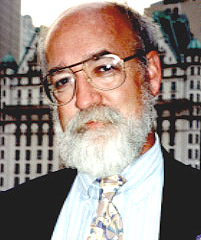| The Third Culture |
| ||||||||||||||||
| Dan
Dennett is our best current philosopher. He is the next Bertrand Russell. Unlike
traditional philosophers, Dan is a student of neuroscience, linguistics, artificial
intelligence, computer science, and psychology. He's redefining and reforming
the role of the philosopher. Of course, Dan doesn't understand my society-of-mind
theory, but nobody's perfect. Dennett's concept of relational order in relation to the brain is something I find extremely interesting. He suggests that the properties of mind aren't material properties, they're relational properties. That leads to the strong AI position. I tend to take a similar view with respect to artificial life ³ a view similar to the strong AI position, the idea that you can actually get intelligence in systems that aren't constituted of molecules and cells. You can get life in computers.
| Daniel C. Dennett "Intuition Pumps" The idea of consciousness as a virtual machine is a nice intuition pump. It takes a while to set up, because a lot of the jargon of artificial intelligence and computer science is unfamiliar to philosophers or other people. But if you have the patience to set some of these ideas up, then you can say, "Hey! Try thinking about the idea that what we have in our heads is software. It's a virtual machine, in the same way that a word processor is a virtual machine." Suddenly, bells start ringing, and people start seeing things from a slightly different perspective. The philosopher Daniel C. Dennett is interested in consciousness, and his view of it, similar to that of Minsky's, is as high-level, abstract thinking. He is known as the leading proponent of the computational smodel of the mind; he has clashed with philosophers such as John Searle who maintain that the most important aspects of consciousness ã intentionality and subjective quality ã can never be computed. He is the philosopher of choice of the AI community. In his more recent work, he has turned to what he calls "Darwin's dangerous idea"; he is squarely in the ultra-Darwinist camp of George C. Williams and Richard Dawkins, and he has with great energy mustered a serious critique of the scientific ideas of Stephen Jay Gould. DANIEL C. DENNETT, the author of Darwin's Dangerous Idea (Simon &Schuster, 1995), is Distinguished Arts and Sciences Professor, Professor of Philosophy, and Director of the Center for Cognitive Studies at Tufts University. His first book, Content and Consciousness, appeared in 1969, followed by Brainstorms (1978), Elbow Room (1984), The Intentional Stance(1987), Consciousness Explained(1991), Darwin's Dangerous Idea (1995), Kinds of Minds (1996), and Brainchildren: A Collection of Essays 1984-1996. He co-edited The Mind's I with Douglas Hofstadter in 1981 and he is the author of over a hundred scholarly articles on various aspects on the mind, published in journals ranging from Artificial Intelligence and Behavioral and Brain Sciences to Poetics Today and the Journal of Aesthetics and Art Criticism. Daniel
C. Dennett's Home Page Further Reading: "Intuition Pumps" in The Third Culture. "The
Evolution of Culture" on Edge
|





